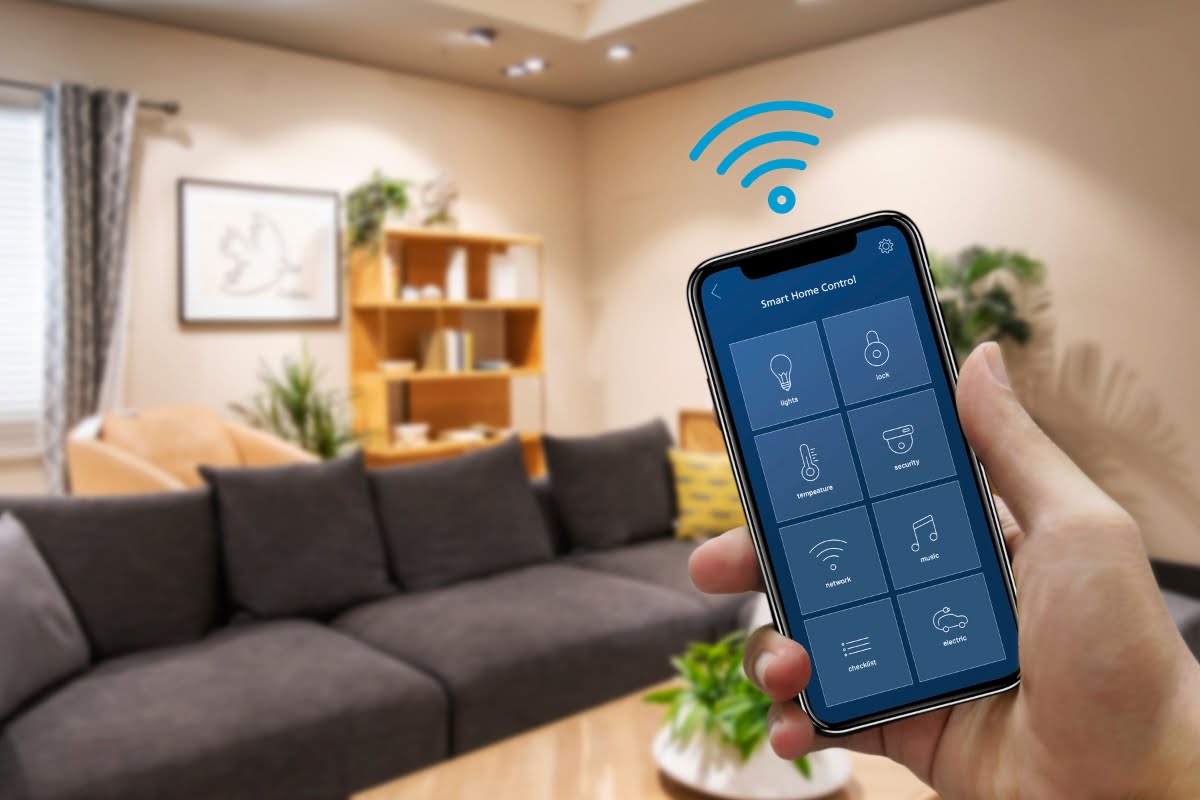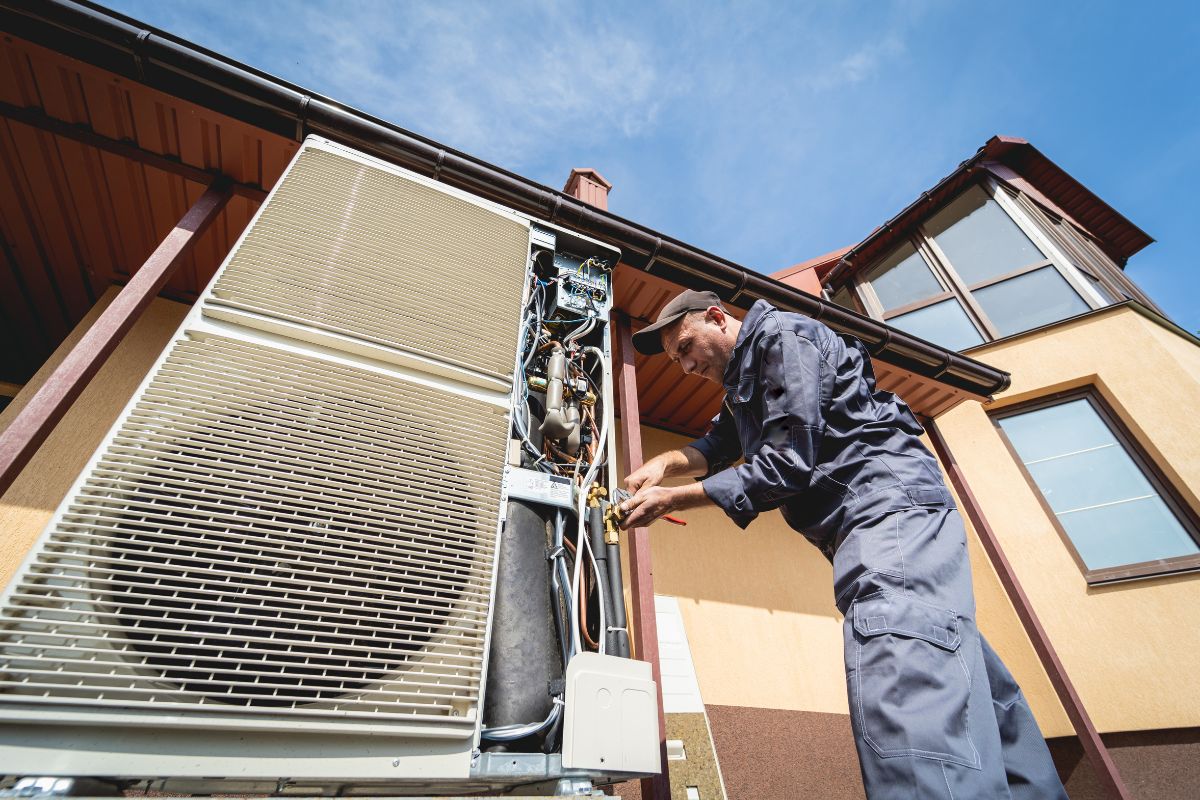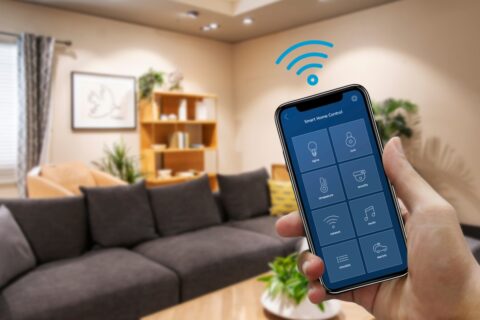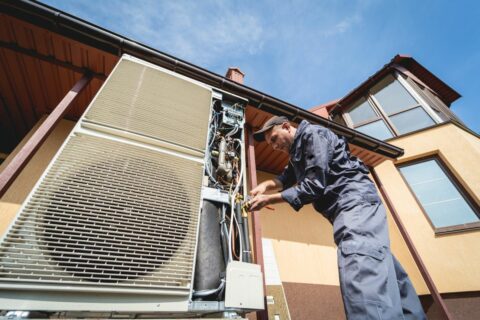In the ever-evolving world of technology, it seems like we’re constantly bombarded with new gadgets that promise to make our lives easier and more efficient. From smartphones that can control every aspect of our homes to virtual assistants that can answer our every question, it’s clear that the future is now. One area where this technological advancement is truly transforming the way we live is in our HVAC systems.
Say goodbye to the days of manually adjusting the thermostat and feeling too hot or too cold in your own home. With the introduction of smart HVAC systems, revolutionizing comfort and efficiency in your home has never been easier. But what exactly makes these systems “smart”? Join us as we uncover the exciting world of smart HVAC systems and experience a transformation in home comfort and efficiency.
Your Key To Ultimate Home Comfort!
How Do Smart HVAC Systems Work?

Smart HVAC systems are changing the way we experience comfort and efficiency in our homes. These advanced systems utilize cutting-edge technology to optimize heating, ventilation, and air conditioning, providing homeowners with a more convenient and energy-efficient solution. In this blog post, we will explore how smart HVAC systems work and the benefits they bring to our daily lives.
- Remote Control and Monitoring: One of the key features of a smart HVAC system is the ability to control and monitor it remotely. Through a mobile app or a web portal, homeowners can adjust the temperature, set schedules, and monitor energy usage from anywhere, at any time. This convenience allows you to have full control over your HVAC system, even when you’re away from home.
- Learning Algorithms: Smart HVAC systems are equipped with learning algorithms that analyze your usage patterns and adjust the temperature accordingly. Over time, the system learns your preferred settings and creates personalized schedules to optimize comfort and energy efficiency. This means that the system will automatically adjust the temperature based on your habits, saving you energy and money in the long run.
- Sensors and Automation: To ensure optimal performance, smart HVAC systems are equipped with sensors that detect occupancy, humidity levels, and outdoor weather conditions. These sensors enable the system to make real-time adjustments, such as turning off the HVAC when no one is home or adjusting the humidity levels to maintain a comfortable indoor environment. This automation ensures that your home is always at the ideal temperature and humidity, while also conserving energy.
- Integration with Other Smart Devices: Smart HVAC systems integrate seamlessly with other smart devices in your home. They can be connected to smart thermostats, voice assistants, and even home automation systems. This integration allows you to control your HVAC system using voice commands or through automated routines. For example, you can set your HVAC system to turn off when you leave the house or adjust the temperature based on the weather forecast.
- Energy Efficiency: One of the main advantages of smart HVAC systems is their energy efficiency. By utilizing advanced technology and automation, these systems can significantly reduce energy consumption compared to traditional HVAC systems. The ability to set schedules, adjust temperature remotely, and optimize settings based on occupancy and weather conditions all contribute to lower energy usage and reduced utility bills.
Smart HVAC systems revolutionize the way we experience comfort and efficiency in our homes. With features like remote control, learning algorithms, sensors, and integration with other smart devices, these systems provide convenience, energy savings, and improved indoor air quality. Investing in a smart HVAC system is not only beneficial for your comfort but also for the environment. So, why not make your home smarter and more efficient with a smart HVAC system?
Types Of Smart HVAC Systems
HVAC systems with smart technology can improve your home’s comfort and efficiency in several ways. These advanced systems utilize modern technology to enhance your heating, ventilation, and air conditioning experience. In this article, we will explore some of the most popular types of smart HVAC systems available on the market today.
- Programmable Thermostats: One of the simplest and most common types of smart HVAC systems is the programmable thermostat. These devices allow you to set specific temperature schedules for different times of the day or week. By programming your thermostat to adjust the temperature based on your daily routine, you can save energy and reduce utility costs.
- Wi-Fi Enabled Thermostats: Wi-Fi enabled thermostats take programmable thermostats to the next level. These devices can be controlled remotely through a smartphone app or computer, allowing you to adjust the temperature of your home from anywhere. Whether you’re at work, on vacation, or simply in another room, you have full control over your HVAC system.
- Zone Control Systems: Zone control systems divide your home into different zones and allow you to control the temperature in each zone independently. This means that you can customize the heating or cooling in specific areas of your home to meet individual comfort preferences. Zone control systems are particularly beneficial for multi-story homes or homes with varying temperature needs in different rooms.
- Smart Vents: Smart vents are designed to improve air distribution throughout your home. These vents can open and close automatically based on the temperature and occupancy of each room. By redirecting airflow to where it’s needed most, smart vents can help maintain consistent temperatures and reduce energy waste.
- Energy Monitoring Systems: Energy monitoring systems provide real-time data on your HVAC system’s energy usage. These systems track how much energy your HVAC system consumes and provide insights on ways to optimize its efficiency. By identifying energy-wasting patterns or components, you can make informed decisions to improve your system’s performance.
- Learning Thermostats: Learning thermostats are intelligent devices that can adapt to your heating and cooling preferences over time. These thermostats can learn your schedule and adjust the temperature accordingly, maximizing comfort and energy savings. They can also provide helpful insights and recommendations to further optimize your HVAC system’s efficiency.
Smart HVAC systems offer a range of innovative features and benefits that can greatly improve the comfort and efficiency of your home. Whether it’s programmable thermostats, Wi-Fi enabled thermostats, zone control systems, smart vents, energy monitoring systems, or learning thermostats, there is a smart HVAC solution to suit every homeowner’s needs. By embracing these advanced technologies, you can enjoy a more comfortable living environment while reducing your energy consumption and saving money on utility bills.
Features To Look For In A Smart HVAC System
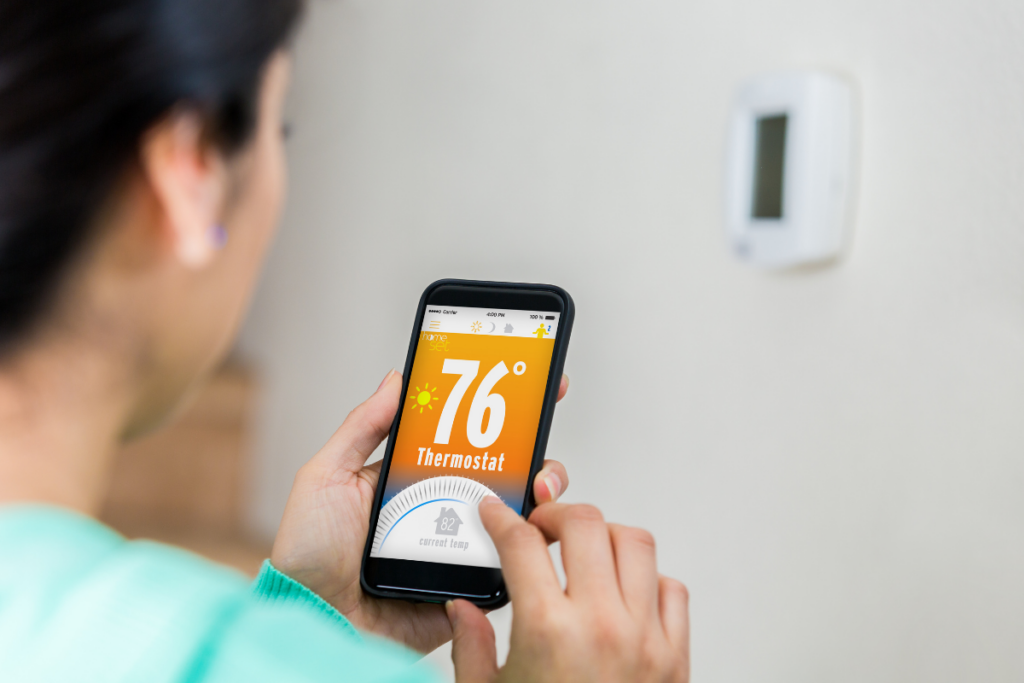
Using smart HVAC systems has transformed the way we experience comfort and efficiency in our homes. With advanced technology and intelligent features, these systems are designed to provide optimal heating, ventilation, and air conditioning performance. If you’re considering investing in a smart HVAC system, here are some key features to look for:
- Wi-Fi Connectivity: One of the most important features of a smart HVAC system is its ability to connect to your home’s Wi-Fi network. This enables you to control and monitor the system remotely using a smartphone app or a web interface. You can adjust the temperature, set schedules, and receive real-time updates, all from the convenience of your phone.
- Learning Capability: Look for a smart HVAC system that can learn from your preferences and adjust its settings accordingly. These systems use advanced algorithms and machine learning to understand your usage patterns and automatically optimize energy consumption. Over time, they can adapt to your needs, providing personalized comfort while maximizing efficiency.
- Zoning Capabilities: Zoning allows you to divide your home into different areas or zones, each with its own temperature settings. This feature is especially useful if you have multiple floors or rooms with varying heating and cooling requirements. With a smart HVAC system that supports zoning, you can customize the temperature in each zone, ensuring comfort and energy savings.
- Integration with Smart Home Platforms: If you have other smart devices in your home, such as voice assistants or smart thermostats, look for a smart HVAC system that can integrate with these platforms. This allows for seamless automation and control, enabling you to create custom scenes and routines. For example, you can set your HVAC system to adjust the temperature when you say, “Goodnight” to your voice assistant.
- Energy Monitoring and Reporting: A smart HVAC system that provides energy monitoring and reporting features can help you track your energy usage and identify opportunities for improvement. It can provide you with insights on how your system is performing and suggest ways to optimize energy efficiency. This information can be invaluable in reducing your energy bills and minimizing your environmental impact.
- Air Quality Monitoring: Indoor air quality plays a crucial role in our overall health and well-being. Look for a smart HVAC system that includes air quality monitoring capabilities. These systems can detect pollutants, humidity levels, and even allergens in the air. With this information, you can take proactive steps to improve indoor air quality and create a healthier living environment.
- Remote Diagnostics and Maintenance: Opt for a smart HVAC system that offers remote diagnostics and maintenance features. These systems can detect faults and issues in real time and provide alerts, allowing you to address them promptly. Some systems even can connect directly with HVAC technicians, simplifying the troubleshooting and repair process.
By considering these essential features in a smart HVAC system, you can make an informed decision and choose a system that meets your specific needs. With the right system in place, you can enjoy enhanced comfort, improved energy efficiency, and greater control over your home’s climate. Embrace the power of smart technology and transform your living space into a haven of comfort and convenience.
Installation And Maintenance Of Smart HVAC Systems
Your home can be made more comfortable and efficient by installing and maintaining smart HVAC systems. These advanced systems are designed to provide optimal heating, ventilation, and air conditioning, while also offering convenient control and energy-saving features. If you’re considering installing a smart HVAC system in your home, or if you already have one and want to ensure its proper maintenance, here are some key points to keep in mind:
- Choose the Right System: When selecting a smart HVAC system, consider factors such as the size of your home, your climate, and your specific heating and cooling needs. Look for systems that offer energy-efficient features, such as programmable thermostats and zoning capabilities, which allow you to customize temperature settings for different areas of your home.
- Professional Installation: It’s crucial to have your smart HVAC system installed by a professional technician who is familiar with these advanced systems. They will ensure that the system is properly sized, correctly installed, and integrated with any existing heating or cooling equipment in your home. Professional installation will also help avoid potential issues and ensure optimal performance.
- Set Up the Control Interface: Smart HVAC systems typically come with user-friendly control interfaces, such as mobile apps or smart thermostats. Take the time to familiarize yourself with the interface and set up your preferred temperature settings and schedules. Some systems even offer learning capabilities, where they adjust the temperature based on your usage patterns, saving you energy and money.
- Regular Maintenance: To keep your smart HVAC system running smoothly, regular HVAC maintenance is essential. This includes tasks such as cleaning or replacing filters, inspecting and cleaning ductwork, and checking for any leaks or issues with the system. It’s advisable to have a professional HVAC technician perform annual maintenance to ensure all components are in optimal condition.
- Utilize Energy-Saving Features: One of the main advantages of smart HVAC systems is their energy-saving capabilities. Take advantage of features like occupancy sensors, which adjust temperature settings based on whether a room is occupied or not. Also, use the system’s scheduling options to set different temperature levels for various times of the day, optimizing energy usage.
- Monitor and Analyze Energy Usage: Many smart HVAC systems provide data on energy consumption. Use this information to track your energy usage and identify areas where you can make further adjustments to save energy. By analyzing these insights, you can make informed decisions on how to operate your HVAC system more efficiently.
- Stay Updated on System Upgrades: Smart HVAC technology is continuously evolving, with manufacturers regularly releasing updates and new features. Stay informed about system upgrades and take advantage of any improvements or enhancements that can further optimize your system’s performance.
It is possible to greatly improve the comfort and efficiency of your home by installing and maintaining smart HVAC systems. With the right system, professional installation, routine HVAC system maintenance, and energy-saving features, you can enjoy a comfortable living environment while reducing your energy consumption and costs.
Say Goodbye To Old-School HVAC: Embrace The Future With Smart Systems

Gone are the days of traditional HVAC systems, where you had to manually adjust the temperature and hope for the best. Smart HVAC systems take this concept to a whole new level by utilizing advanced technology to not only regulate the temperature but also learn your preferences and adjust accordingly. Imagine walking into your home after a long day at work and being greeted by the perfect temperature every time, without lifting a finger. That’s the power of smart HVAC systems!
Ready to experience the epitome of smart home comfort? Look no further than AD Campbell HVAC Services! Our expert team specializes in seamless installation of cutting-edge smart HVAC systems. From energy efficiency to personalized comfort, our smart solutions will enhance every aspect of your living space.
Don’t miss out on the opportunity to transform your home into a smart haven. Get in touch now to schedule your HVAC service appointment. Together, we will embark on a journey to a more comfortable and efficient future!


